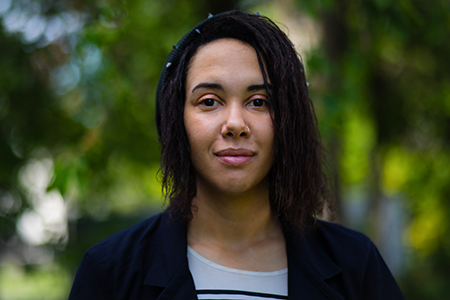With the support of CEE – Consortium of Engineering Schools, APDC – Portuguese Association for the Development of Communications, launched in February 2021, the Best Thesis Award, with the aim of rewarding annually the best master’s dissertations in the areas of Information Technology, Telecommunications and Media.
This year, in a ceremony associated with the 31º Digital Business Congress, the dissertation “Generative Soundscapes for Enhanced Engagement in Non-Invasive Neurorehabilitation”, by Aisha Jeanette Animashaun, Master in Multimedia Alumna, was awarded in the Media area.
The Dissertation, concluded in July 2021, was supervised by Prof. Gilberto Bernardes, Assistant Professor at DEI and Coordinator of the area of Interactive Music and Sound Design of the Master in Multimedia, who tell us more about this research:
“The lack of engagement and motivation, also referred to as apathy, has a negative impact on the treatment effectiveness and well-being of people with neurocognitive disorders such as dementia. In this context, we aimed to assess whether the engagement of people with dementia during non-invasive treatments is affected by noise levels from surrounding sound sources and negative auditory stimuli present in treatment environments. An online survey gauged that disruptive auditory stimuli and noise levels influence engagement and adherence levels of demented individuals during treatment. Negatively perceived sound sources were identified in both therapy facilities and at home, such as human voices, household appliances, and household noises. The results indicate that the perception of higher noise levels in therapeutic facilities is in correlation with the lower rate of perceived adherence during the therapy session compared to the lower noise level and higher engagement found when demented individuals interact at home. A generative sound environment strategy was proposed to dynamically mask the frequency bands of noise identified with negative auditory stimuli to promote a relaxing soundscape from a range of ambient sounds connoted in the literature with low degrees of valence and arousal.”
In conversation with Aisha, she shared with us the enormous satisfaction of receiving this distinction:
“To me, it is not so much about winning as it is to celebrate the people involved in the journey. I was thankful that all the work on the project as well as the input from my supervisor, professors, colleagues, friends, and family have been recognized through this award. I am really passionate about research that aims to improve health and wellbeing and I am thrilled that it translated well into the research project!”. When asked about the biggest challenge encountered during this journey, Aisha tells us that “The biggest challenge, as in so many projects from 2020 onwards, was the pandemic. My initial focus had to shift in order to eliminate the risk for health-impaired individuals. However, the support I received from my supervisor and surroundings helped me identify a more focused path and made the project even stronger than the previously proposed plan. I think one of the biggest achievements or most exciting events was to actually work with participants during the experiment and get their feedback on our prototype. Their openness to including multimedia technology in treatments for neurorehabilitation and the suggestive results of a higher engagement during the test was very encouraging.”
What about plans for the future?
“I would like to conduct further research into neurorehabilitation and neurocognitive disorders making use of multimedia-focused interventions and ultimately embark on a PhD journey to fuel my passion for research and learning”.
We wish you all the best Aisha!
Recalling last year’s edition, André Cruz, Alumnus of the Integrated Masters in Informatics and Computer Engineering, was also distinguished with this Award, in the area of Information and Communication Technologies, with his dissertation “Fairness-Aware Hyperparameter Optimization”, which focused on the study of biases and potential discriminations in the use of artificial intelligence systems related to gender, age, ethnicity or geographical location. The awarded research resulted in a new algorithm – Fairband, which allows training fairer models, increasing the fairness of automatic decision processes by 93%, on average. More about it can be seen here.
